Are You Caring for a Loved One with Dementia in Hamilton? Here’s What You Should Know

Caring for a loved one with dementia in Hamilton can be one of the most rewarding—and one of the most emotionally demanding—roles a family member can take on. If you’re wondering how to support them while also caring for yourself, you’re not alone. As Dementia Action Week (19–25 May 2025) approaches, it’s a timely reminder that practical help, emotional support, and trusted local care are available. At Home Instead Hamilton, we work alongside families every day to provide respectful, personalised care that helps people live well with dementia, while ensuring carers feel supported and confident in the care they give.
In this blog, we’ll explore what to expect from dementia, how to manage challenges with compassion, and where to find local support—whether you’re just starting your journey or looking for help now.

Understanding Dementia and Its Impact
Dementia is not a single illness but a term covering a group of symptoms that affect memory, reasoning, and daily functioning. The most common cause is Alzheimer’s disease, which progresses over time and affects individuals differently.
Symptoms might include:
- Memory loss
- Confusion and disorientation
- Mood swings and personality changes
- Difficulty with communication
- Wandering or repetitive behaviours
As the disease develops, family members often find themselves stepping into ataking on a consistent support role This shift can be overwhelming, especially without a clear understanding of what to expect or how to cope.

The Three Stages of Alzheimer’s
Recognising the stage your loved one is in can help you tailor your care approach:
Early Stage
Often characterised by mild forgetfulness and some difficulty with planning or problem-solving. The person may still be independent but benefit from gentle reminders, calendars, and help staying organised.
Middle Stage
Confusion becomes more pronounced. The person may forget familiar names, get lost, or struggle with personal care. Behavioural changes like agitation or suspicion are common. Daily assistance becomes increasingly necessary.
Late Stage
Individuals typically lose the ability to communicate clearly and need support with everyday personal tasks. They may no longer recognise loved ones and are more vulnerable to infections and other health complications.
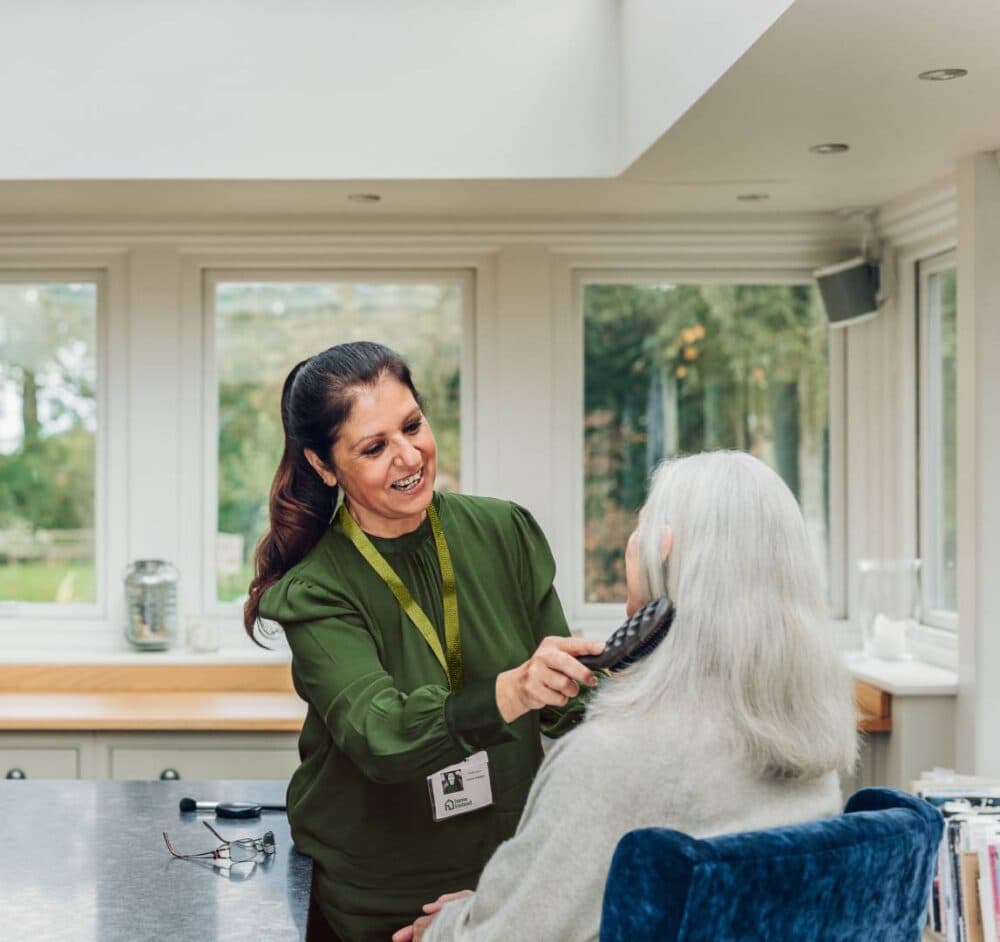
Managing Changes in Behaviour: Strategies That Help
Caring for someone with dementia often means responding to behaviours that can be distressing. These might include aggression, withdrawal, or seeing or hearing things others don’t. Here are four approaches observed among caregivers, each with its own impact:
Gentle Approach
This involves calm tones, emotional validation, soft redirection, and physical comfort like a touch on the shoulder or holding a hand. It’s often effective but demands immense patience.
Persistent Approach
Used with care and compassion, persistence can maintain safety and routines. Repeating simple instructions until a task is done (like brushing teeth or eating) can prevent health risks.
Disengaged Approach
Sometimes stepping away briefly is the safest option, especially to avoid conflict. However, using this too often may result in neglect or feelings of abandonment.
Harsh Approach
Frustration can lead some carers to shout or issue ultimatums. Though sometimes prompting compliance, this usually leads to guilt and emotional strain for both parties.
Long-term caregivers often find that combining patience with practical tools allows for a more manageable and respectful approach.

The Emotional Weight of Caregiving
Caring for a family member with dementia affects mental and physical health. A significant number of caregivers experience symptoms of depression, anxiety, and burnout. It’s common to feel overwhelmed, especially when your loved one becomes upset, forgetful, or resistant to help.
Caregivers might struggle with:
- Disturbed sleep
- Physical fatigue
- Isolation
- Feelings of guilt or helplessness
This the emotional impact is significant and deserves support. Asking for help, taking breaks, and talking to professionals or peer support groups are all ways to maintain your wellbeing.
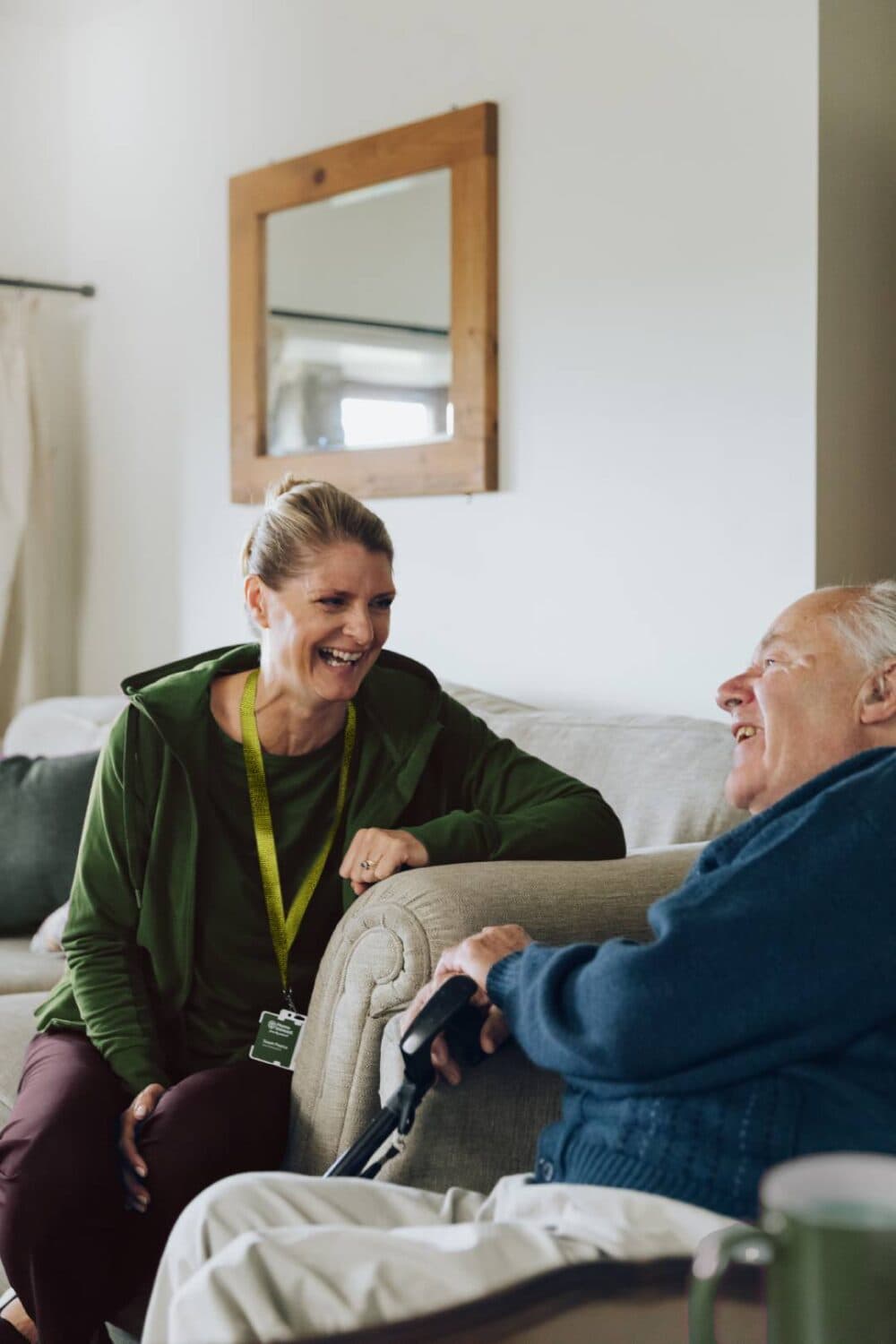
Creating a Safe, Familiar Home Environment
A calm and secure environment can make a big difference in how someone with dementia experiences their day. Try these practical adjustments:
- Remove trip hazards such as loose rugs or wires
- Install grab bars in bathrooms
- Lock away harmful items like medicines or cleaning products
- Use motion sensors or door alarms to reduce the risk of wandering
- Keep colours and patterns simple to avoid confusion
Maintaining familiarity is equally important—family photos, favourite chairs, and well-loved routines all provide reassurance.

How to Communicate More Effectively
As dementia progresses, verbal communication becomes more difficult. Try adapting your style:
- Use short, clear sentences
- Speak slowly and directly
- Maintain eye contact
- Avoid correcting unnecessarily
- Reassure and acknowledge feelings
- Use touch and gesture to support understanding
Even if words are lost, emotional understanding often remains. A kind voice or a reassuring smile can go a long way.

Creating Structure Through Daily Routine
Consistency offers stability. Try setting regular times for:
- Meals
- Personal care
- Medication
- Rest
Incorporate meaningful activities—these don’t need to be complicated. Gentle exercise, music, painting, or simply folding towels can bring comfort and a sense of purpose. Choose activities that match the individual’s current abilities and interests.
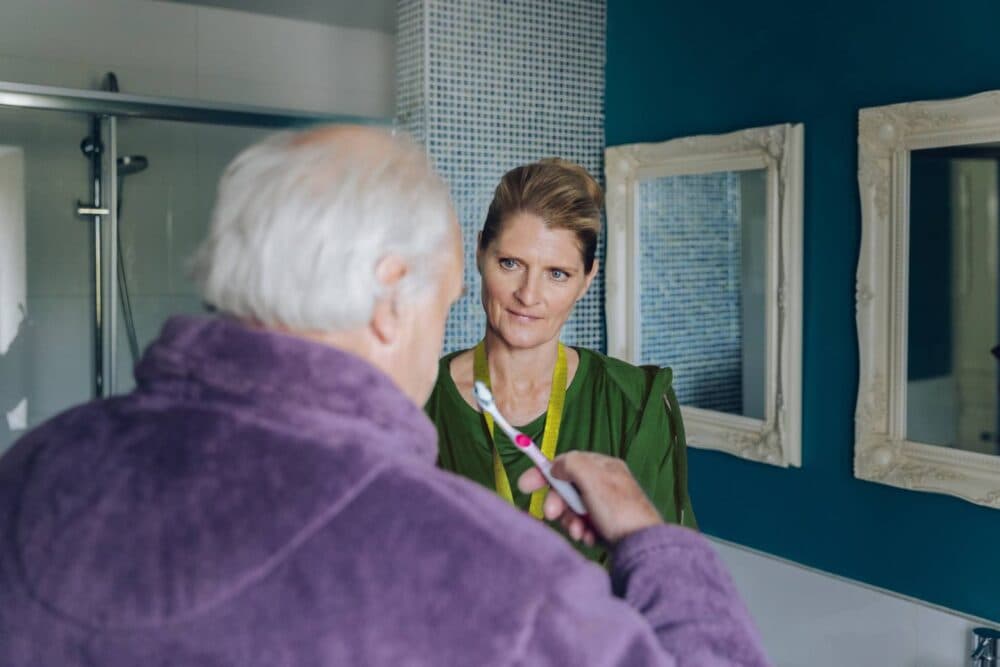
Planning for What’s Ahead
While it’s not always easy, early planning can make future decisions less stressful:
- Talk about care preferences early in the diagnosis
- Arrange for powers of attorney and advance directives
- Discuss long-term care options, including in-home care, respite support, or memory care facilities
- Review plans regularly as needs change
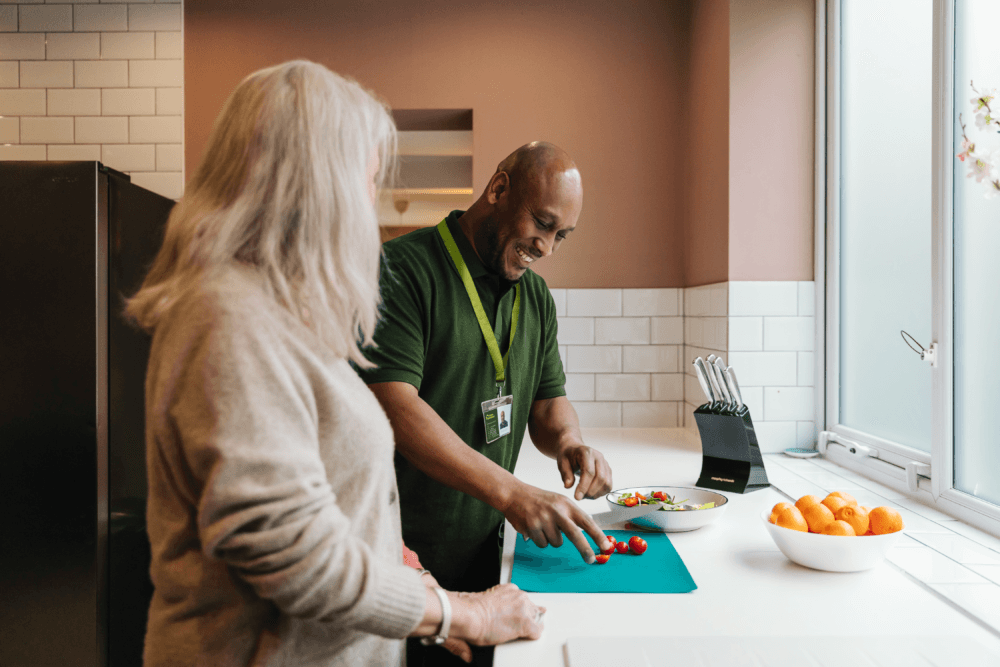
When Hospice Care Might Be the Right Support
Hospice support is often associated with cancer, but it’s also valuable for people in the later stages of dementia. It can be appropriate in the late stages of dementia when comfort and quality of life become the focus.
Hospice support can:
- Help manage pain and agitation
- Offer emotional and spiritual support
- Provide respite for exhausted family caregivers
Seeking hospice doesn’t mean giving up—it means ensuring the best quality of life possible.

Hospital Visits: Navigating a Difficult Situation
Acute care settings can be especially distressing for someone with dementia. The unfamiliar environment, noise, and interruptions can worsen confusion.
Helpful changes include:
- Involving family carers in care planning
- Training hospital staff in dementia communication
- Keeping routines familiar when possible
Hospitals and carers working together can improve comfort and reduce distress.

Where to Find Support in Hamilton
Caring for someone with dementia should never be done alone. At Home Instead Hamilton, we offer specialised dementia care tailored to each stage of the condition. Our trained Care Professionals provide support at home, giving family carers a much-needed break and peace of mind.
Additionally, there are excellent resources and support services available:
- Local carer support groups
- NHS Scotland dementia care advice
- Alzheimer Scotland’s helpline and workshops
- Community memory cafés and carer information sessions
If you’re looking for practical help or someone to talk to, we’re here to listen and guide you.
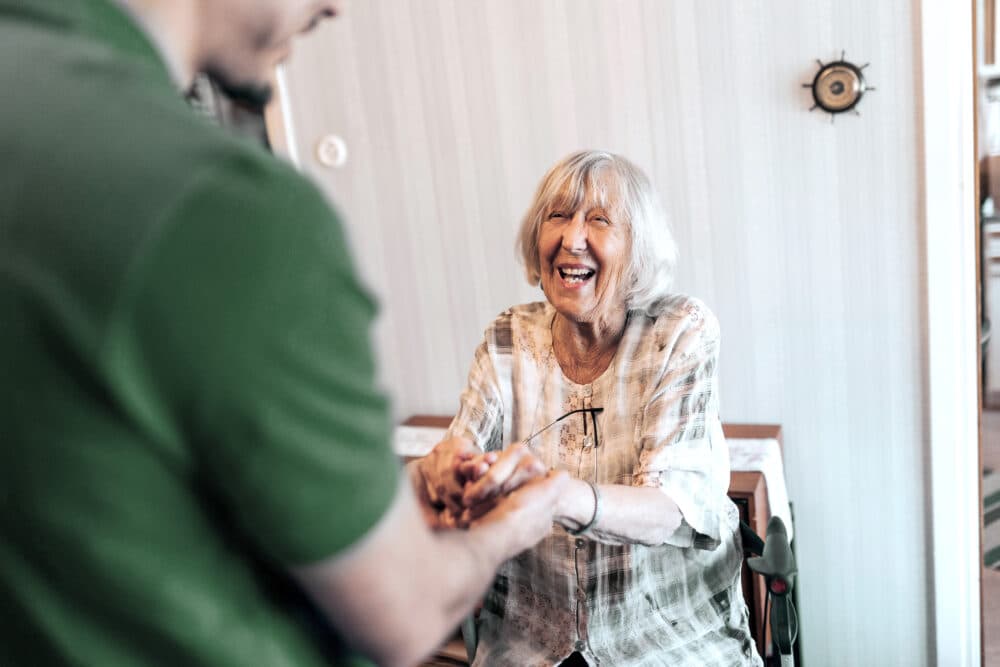
What’s Happening for Dementia Action Week 2025?
At Home Instead Hamilton, we’re proud to support families across the area during Dementia Action Week (19–25 May 2025). This year, Home Instead is taking part in a range of community-focused activities to raise awareness, offer guidance, and bring people together in support of those living with dementia and their families.
Whether you’re caring for someone or simply want to learn more, we’d love to see you there. For more details, just get in touch with our local team.

Taking Care of Yourself
To care for someone else, you must also care for yourself. That might mean:
- Taking short breaks during the day
- Attending a weekly support group
- Practising relaxation techniques
- Making time for walks or hobbies
- Talking to a counsellor or therapist
These aren’t luxuries—they are necessary steps to protect your own wellbeing. A healthy caregiver is better equipped to provide consistent, compassionate care.

Final Words of Encouragement
Supporting someone with dementia is never easy, but you are not on your own. With the right knowledge, environment, and support, you can help your loved one live with dignity and comfort.
If you’re based in Hamilton and need assistance, Home Instead is here to help. We offer professional, localised dementia care with heart and understanding. Whether you need regular visits, respite care, or just someone to talk to about your next steps, we’re only a phone call away.

FAQs
Is it safe to restrict movement for someone with dementia?
No. Consider using visual cues or discreet alarms to maintain safety while respecting their dignity.
How can I calm someone who is distressed?
Speak calmly, redirect their attention, provide comfort objects, and avoid confrontation.
What support does someone with Alzheimer’s need?
Daily task assistance, emotional support, safe environments, and structured routines.
How do I plan care for someone with dementia?
Discuss preferences early, set up legal permissions, and plan for evolving care needs.
Is hospice only for cancer patients?
No. Hospice care is available for advanced dementia to provide comfort and support.
For support and dementia care services in Hamilton, contact Home Instead Hamilton at Home Instead South Lanarkshire – Hamilton. Let’s face dementia together, with compassion and confidence.
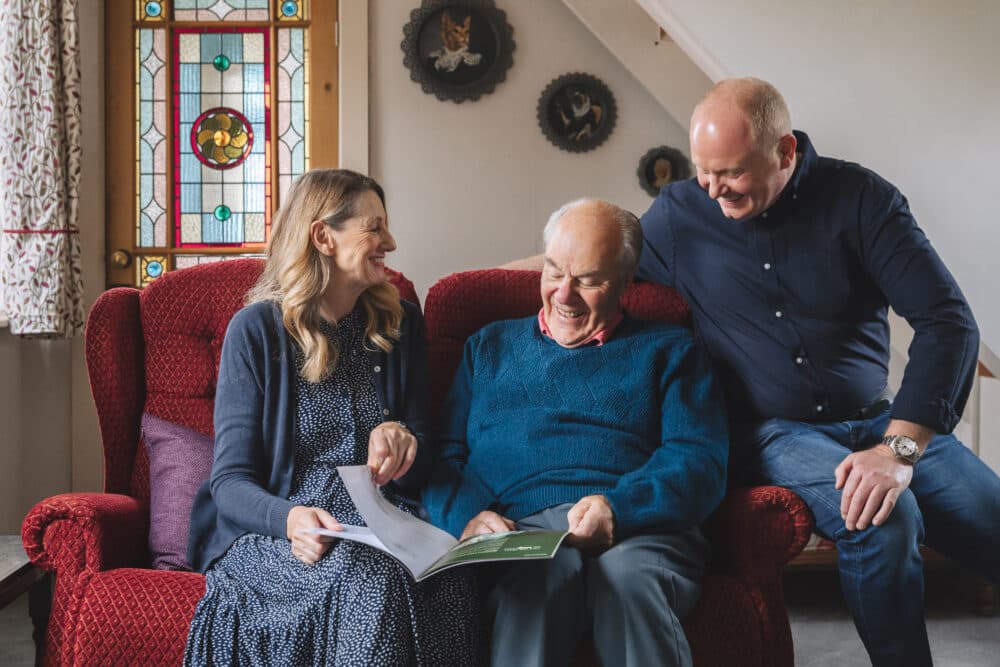
Areas We Serve
Hamilton, Uddingston, Motherwell, Bothwell, Strathaven, Bellshill, Rutherglen, Cambuslang
G71 5, G71 6, ML2 7, ML4 3, ML1 3, ML1 2, ML2 0, ML4 1, ML4 2, G72 6, G73 5, G71 8, G72 9, G73 4, G71 7, ML1 1, ML1 4, G72 0, ML2 8, ML1 5, G72 8, G72 7
Unit 2 Brandon House Business Centre, 23-25 Brandon St, Hamilton ML3 6DA